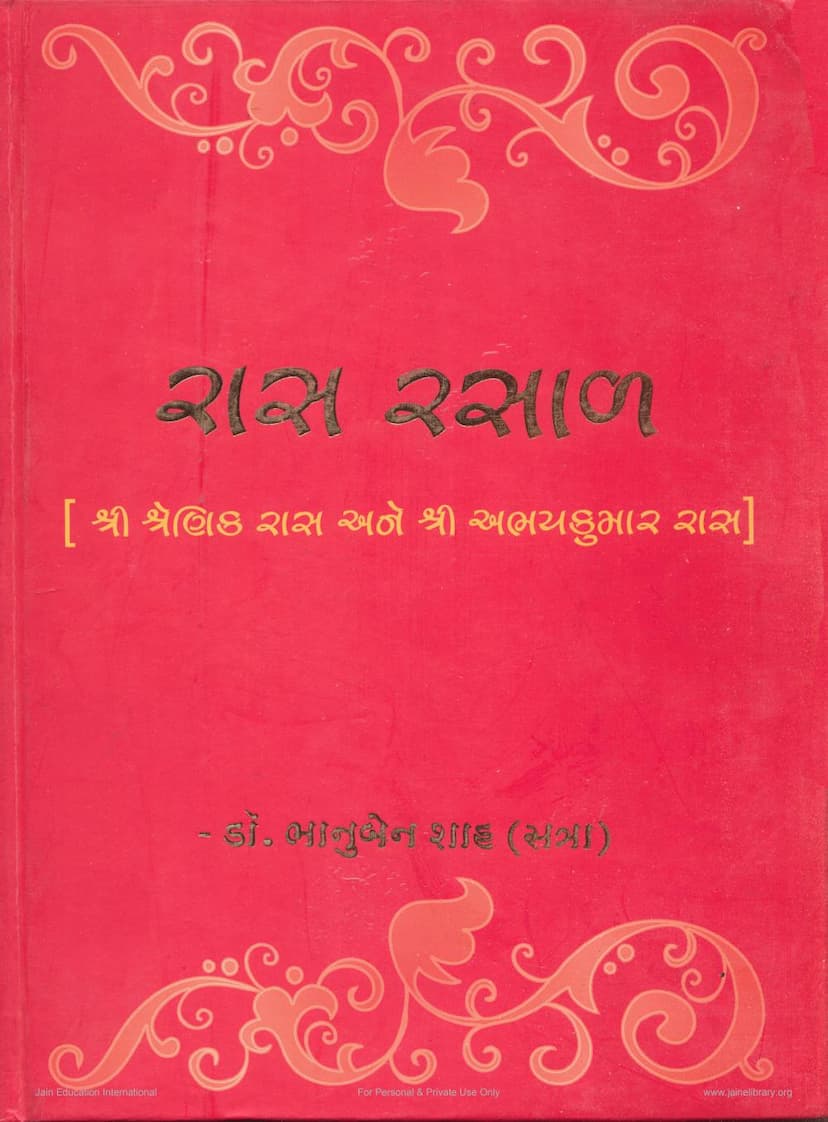Ras Rasal
Added to library: September 2, 2025

Summary
The book "Ras Rasal" by Bhanuben, published by Jain Sahitya Prakashak Samiti, is a compilation and edition of two Jain Rasa poems: "Shri Shrenik Raas" and "Shri Abhaykumar Raas," originally composed by Kavi Rishabhdas. The book was edited by Dr. Bhanuben Jayantilal Shah (Satra).
The text primarily serves as a scholarly edition of these ancient Jain Rasa poems, aiming to present them to a wider audience with annotations and explanations. Here's a breakdown of the key aspects based on the provided pages:
Core Content:
- "Shri Shrenik Raas" and "Shri Abhaykumar Raas": The book focuses on two specific Rasa poems by Kavi Rishabhdas. Ras poems are narrative ballads, often devotional in nature, composed in verse, and popular in Jain literature. They typically recount the lives and deeds of important figures.
- Kavi Rishabhdas: The original author is identified as Kavi Rishabhdas, a Jain monk poet from the medieval period, known for his numerous Rasa compositions that enriched Gujarati literature. He is described as having a simple, captivating style filled with religious teachings.
- Dr. Bhanuben Shah (Satra): The editor and researcher, Dr. Bhanuben Shah, has meticulously worked on the original manuscripts. Her doctoral work, "Sammatam," based on Kavi Rushabhdas's "Samkit Sar Raas," was published previously. This current work further delves into Rishabhdas's compositions, specifically "Shri Shrenik Raas" and "Shri Abhaykumar Raas."
- Content of the Raases:
- Shri Shrenik Raas: The first Raas details the life of King Shrenik, a devoted follower of Lord Mahavir Swami. It covers his life story, influenced by Queen Chellana and the teachings of Anath Muni. The Raas includes descriptions of King Shrenik's intelligence, devotion to Lord Mahavir, loyalty of King Chedi, and Abhaykumar's detachment. It also mentions Shrenik's past lives and his future potential as a Tirthankar.
- Shri Abhaykumar Raas: This Raas focuses on Abhaykumar, Shrenik's wise and virtuous son, described as intelligent, knowledgeable, and a great administrator. It highlights his shrewdness, his ability to resolve complex issues, and his profound devotion to Jain principles. The Raas also touches upon his detachment and eventual renunciation.
- Scholarly Editing: Dr. Bhanuben Shah's edition includes:
- Lipi-karan (Transcription): Making the ancient manuscripts legible.
- Brief Review: Providing an overview of each Raas.
- Meaning of Verses: Explaining the verses of each stanza (dhal).
- Difficult Word Meanings: Clarifying archaic or complex vocabulary.
- Information on Desis: Explaining the rhythmic patterns (Desis) used in the Raases.
- Appendices: Including valuable information such as the introduction to Chakravarti, Baldev, and Vasudev; names of future Tirthankaras; stories from the Raases; a list of Desis; a glossary of difficult words; and a bibliography.
- Dedication: The book is dedicated to the memory of Pujya Gitarth Gurudev Navalchandji Swami ji, a prominent figure of the Limbdi Ajramara Sampraday, and his lineage of spiritual leaders.
- Praise and Blessings: The book features blessings and congratulatory messages from Muni Adarsh (Shree Limbdi Ajaramar Sampraday) and Sadhvi Jarnakumari ji, acknowledging Dr. Bhanuben Satra's dedication to preserving and publishing Jain literature.
Key Themes and Aspects Highlighted:
- Preservation of Jain Literature: The book's publication is seen as a significant contribution to the preservation of medieval Jain literature, which often exists in manuscripts.
- Research and Scholarship: Dr. Bhanuben Shah's dedication to researching and editing Kavi Rishabhdas's works, including her Ph.D. on "Samkit Sar Raas," is recognized and appreciated.
- Inspiration from Great Lives: The Raases serve as a source of inspiration from the lives of historical Jain figures like King Shrenik and Abhaykumar, encouraging readers to learn from their virtuous conduct.
- Jain Philosophy and Ethics: The Raases contain profound religious teachings, emphasizing concepts like virtuous conduct, devotion, detachment, and the importance of spiritual knowledge for liberation.
- Literary Merit: The Raases are appreciated for their engaging narrative, simple yet devotional style, and the skillful weaving of musical elements (Desis and Raags).
- Language and Style: Kavi Rishabhdas's use of accessible Gujarati, enriched with traditional poetic elements, is noted.
In essence, "Ras Rasal" is a valuable academic and spiritual work that brings to light and preserves significant medieval Jain literary compositions, highlighting the rich heritage of Jain storytelling and the scholarly efforts to make it accessible.